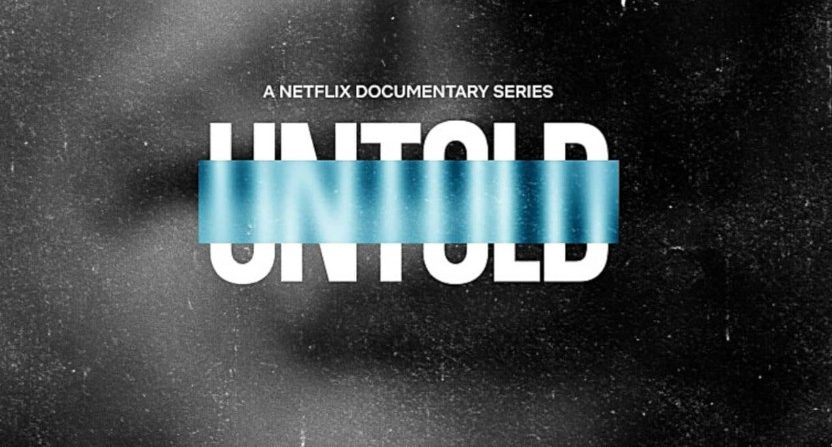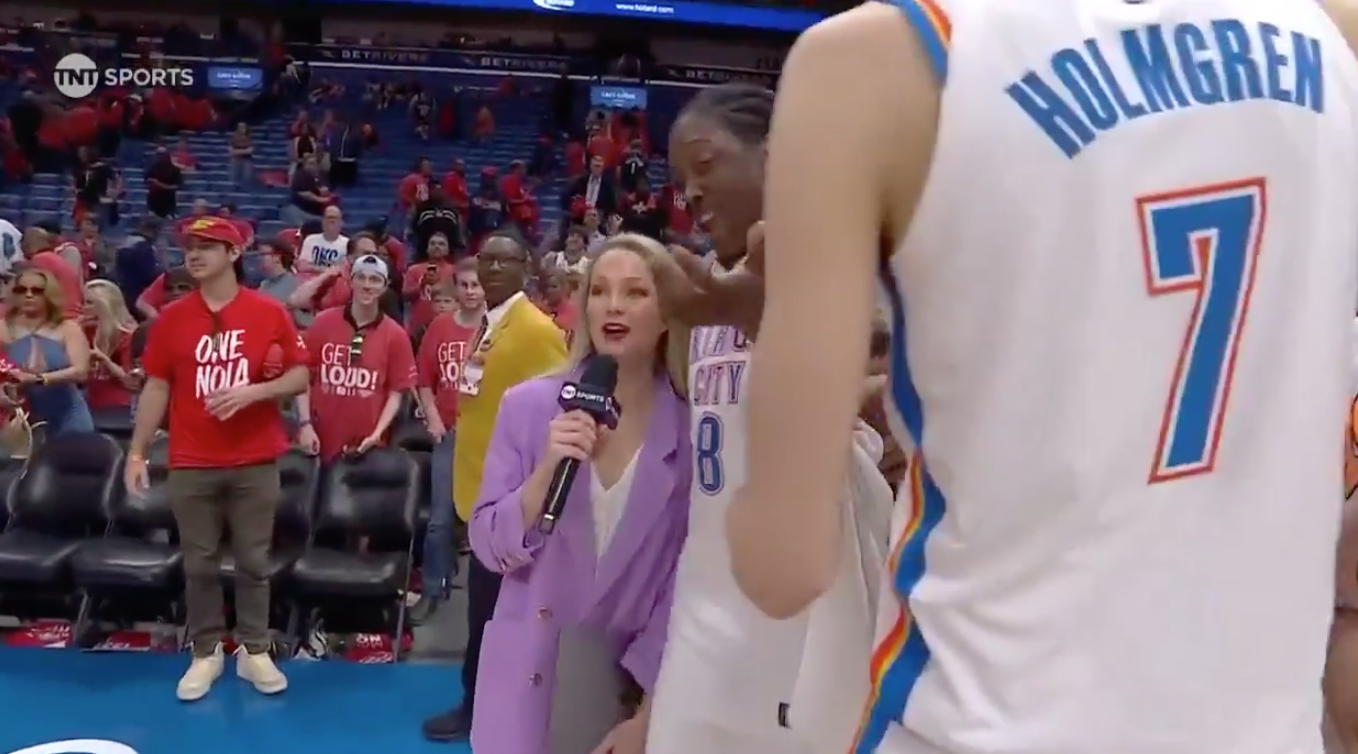The Untold series of documentaries is back for its third volume, which began with this week’s premiere of Untold: Jake Paul the Problem Child. That will be followed by Untold: Johnny Manziel (Aug. 8), Untold: Hall of Shame (Victor Conte and BALCO, Aug. 15), and Untold: Swamp Kings (the Urban Meyer/Tim Tebow era of Florida football, four parts, Aug. 22). Series creators and executive producers Maclain and Chapman Way recently spoke to AA on the series and Vol. 3, and revealed they’re already at work on Vol. 4 for next August. Chapman Way said it’s been terrific to see how the series has been embraced, and to see it make it to at least four seasons.
“When we started, you always have these unrealistic dreams, ‘Hey, we’ll do five or six seasons of this!'” he said. “There’s so much time and effort into building the show, and there are so many people, close collaborators that are really good friends that work on it. So every year that you hear you’ve been greenlit for another season, it’s just the most incredible feeling. For us, this has definitely exceeded our expectations that we’re now working on Vol. 4 already. …This has been a really super cool journey to go on with Untold.”
Maclain Way said part of the reception that’s impressed him is that the documentaries to date have seemed to connect with people beyond hardcore sports fans.
“I think what’s been fun is seeing how non-sports fans have come into these Untolds,” he said. “It’s the compliment we love getting most, with episodes we’ve produced and directed like the Trashers [Vol. 1’s Crime and Penalties, on the Danbury Trashers], which is on a minor-league hockey team, or America’s Cup, which is on a sailing race [Vol. 1’s The Race of the Century, on the 1983 America’s Cup]. They’re ultimately not large fandoms, but bringing people in and having them resonate has been unbelievable.”
He said it’s also been interesting to see the discussion some of these have generated amongst sports fans.
“But also, on the flip side, there are some diehard fandoms that were very interested. Releasing the Tim Donaghy documentary [Vol. 2’s Operation Flagrant Foul] and seeing NBA Twitter wrestle with that was very interesting and exciting, and reading heated opinions on it. Ultimately, the more I do these, the more you just root for people to watch and talk about it one way or another, debate, wrestle, like characters, hate characters. It’s the reason why we make these things, and ultimately, I think that’s what keeps us coming back.”
Chapman Way said one evolution of the series to date (the brothers also spoke to AA ahead of Volumes 1 and 2) is that they’re now often going after some bigger targets.
“One of the things that I think Untold is starting to do is focus on maybe slighter higher-profile stories and subject. I still think we love being able to get a few of the lesser-known stories in there that people might not be so familiar with, like America’s Cup and the Trashers. That’s vital to the universe that is Untold. But I think we’ve found that audiences really connect with stories that are raw, and provocative, and complex, and maybe don’t offer easy answers, and leave it up to the audience to decide how they feel about some of these subjects. And I think that’s something that we’re excited to keep exploring.”
While the earlier Untold volumes all had some perhaps lighter entries, from Race of the Century to Vol. 2’s The Rise and Fall of And1, alongside the heaviest topics, the figures featured in Vol. 3 are all relatively controversial . Chapman Way said that was more a function of timelines and logistics than a narrative focus for this season, but he is happy with the topics they’ve wound up with, and think they have potential to generate significant discussion.
“It didn’t start off as intentional. I think a lot of it is just logistics and scheduling and when you can shoot certain episodes. But clearly, I think we realized getting into the edit bay that these are athletes and subjects that people have some very strong opinions. I think that makes it very exciting as a filmmaker, because that starts your brain on ‘How do we subvert expectations in certain ways? How do we show sides of people that people didn’t expect or weren’t aware of?’ I think the greatest gift we can give as filmmakers or showrunners is to subtract our personal feelings and beliefs about these people and this story and try and give something to the audience to make up their own mind about how they feel about it. That’s a north star for us here at Untold.”
Maclain Way agreed that it wasn’t an intentional move to have this year’s documentaries all feature controversial subjects, but that it’s worked out.
“Ultimately the benefit is what Chapman touched on; controversial in the edit bay more often than not translates to combustibility and an unpredictableness. And that’s what’s exciting about doing these, how these characters can create twists and turns and hopefully some unexpected results and storytelling. That’s usually what we’re after.”
One different thing with Vol. 3 is the series’ first four-part documentary in Swamp Kings. Chapman Way said that happened for a couple reasons; one is that it originated outside the Untold series, and the other is that was best for the story.
“Swamp Kings was a story that initially started out in production outside of Untold, it wasn’t part of our original production. Then towards the end of the project, we’d been working with Netflix on building out the Untold banner and kind of broadening it and bringing in more stories. And we all loved Swamp Kings, and thought it was incredible, and thought it would fit in perfectly to the Untold universe. That was one that initially, from the get-go, started off as multiple seasons. And we’ve got a couple stories: Manti Te’o was a two-parter, we’ve got a couple other stories in Untold that might be multiple parts. ‘Whatever suits the story best’ is kind of our motto.”
On that banner, Chapman Way said more than particular topics, Untold is looking for specific kinds of stories. And he said they also need to find subjects who are open to having their full story told, even the unflattering parts.
“I think for us it’s raw, complex, compelling stories that’s what we’re looking for. There’s a ton of sports media, a lot of sports documentaries, a lot of, like, vanity sports documentaries. And I think audiences are smart and they sniff that stuff out right away. Our agreement with our athletes has always been ‘We will tell your whole story, but that includes everything, the highs and the lows, maybe some things you’re not so proud about.’ When the audience clicks on an Untold, we want them to know that they’re going to go on a real roller-coaster ride and they’re going to get a whole experience.”
While some athletes definitely want fuller control than Untold might be willing to provide, Chapman Way said he thinks a lot of their potential subjects understand the value of a more independent look.
“I think athletes kind of get it. A lot of these vanity sports docs kind of come and go, they don’t really drive conversation, and no one watches it. I think athletes understand that audiences are smart and that they want real storytelling.”
Maclain Way said another important factor there is that unlike many documentary projects, the Untold series doesn’t have to work extensively with leagues.
“I think the other thing that’s interesting in the sports media landscape that probably isn’t known by the public or talked about a lot is that leagues have extraordinary control over sports documentaries, oftentimes more than athletes or the subjects involved. Because especially if you’re making an archival sports documentary series, you have to work with them on copyright, on footage they own, on trademarks. It’s complex. I think one of the great things about Untold in maintaining independence and being able to kind of tell more provocative stories is that we are independent from having any relationships with any leagues, and that really goes a long way in trying to capture the provocative storytelling we’re interested it.”
The latest
- Could NFL see next Saudi sportswashing controversy?
- ESPN and NBA have reportedly ‘essentially come to terms’ on deal that would keep Finals on ABC
- G/O Media sells The Onion to ‘Global Tetrahedron,’ ex-NBC reporter Ben Collins to serve as CEO
- Eli Gold on Alabama exit: ‘You can’t argue with city hall.’
“We wish we could have directed one. It was just purely a schedule thing. We’re working on another two-part documentary for Netflix right now that we’re editing every day, so we just weren’t able to direct one. But aside from that, it was a very similar experience of running this show, with another showrunner, Ryan Duffy. It’s everything from choosing the stories and hiring directors to being in the edit bay with the editors and helping shape the story and the edit. We weren’t able to direct, but we’re looking right now at directing one for Vol. 4 that we’re really excited about and hopefully will start soon. So we’ll get back on the horse.”
Maclain Way agreed that that was a positive experience, and that it’s helped to work with such talented directors.
“Yeah, it’s been great. Ryan Duffy, who directed our Manti Te’o one, he also directed the Johnny Manziel one, and also doubled as the entire showrunner for this volume, he’s done a remarkable job running the day-to-day. I think in practical, this volume was a lot less physical production for us, almost none. Whereas in the earlier volumes, you’d travel a lot, you have to be on set a lot, you do interviews, you kind of pinch-hit across all the different episodes.”
“This one was very fun in the sense that we kind of got to slide into the edit bay. And we work so well with, like, Andrew Renzi, who did the Jake Paul episode, and Bryan Storkel, who directed the BALCO episode, he’s one of our favorite documentary filmmakers working today, and then of course we got to work with Ryan again on the Johnny Manziel episode. For us, it’s one of the best jobs to have, honestly.”
Chapman Way concurred, saying this worked because of the talent they’re working with.
“We get to cheerlead some of our favorite artists and just be there to support them.”
As for Vol. 4, no specifics on it are available yet, but Chapman Way said to expect it next August.
“It’s kind of cool that we’ve got this month of August kind of lined up as the Untold sports month now. It’s cool that audiences can expect that every August. And it’s our favorite month of the year.”







